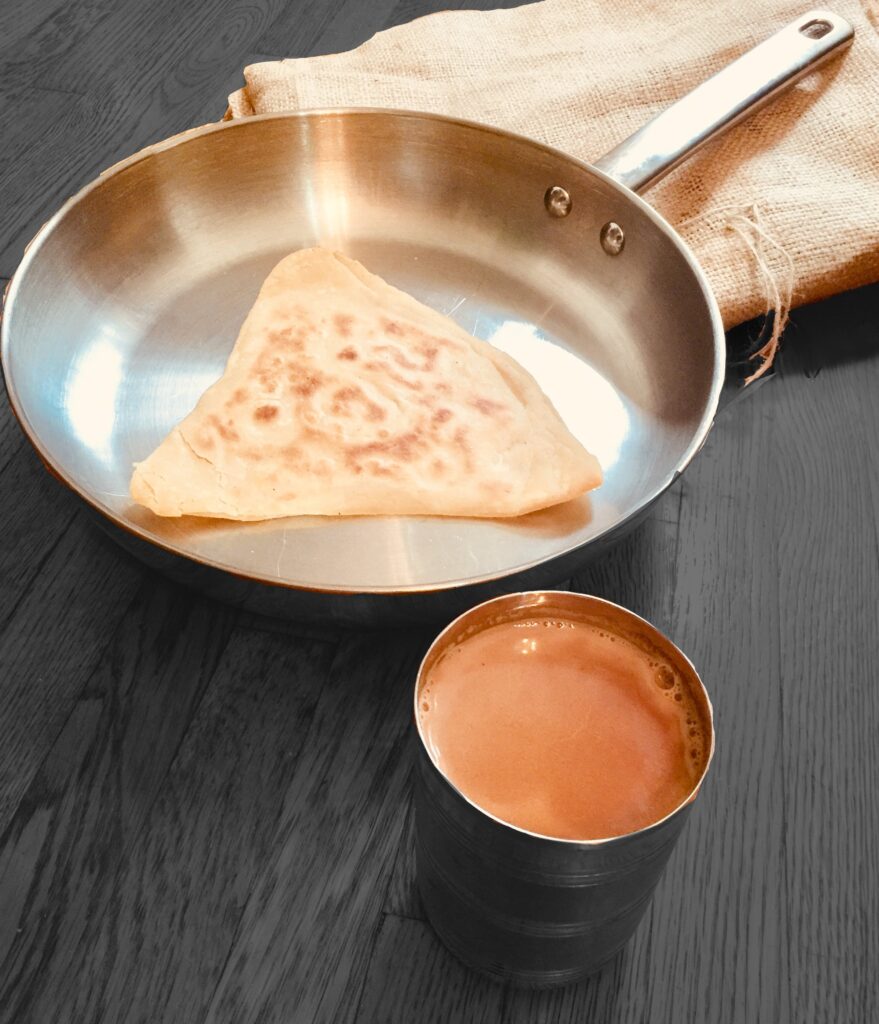Translated from the Bengali by Upama Mukherjee
It has been long since I walked the lane bordered on both sides by those purple crapes, lying under the unmoving shadows of the ancient sacred fig. How long has it been since I walked like a cynosure basking in the loving-kindness of yellow, golden, and red spring blossoms? How long since I adorned myself with crown flowers, glory bowers, or the tiny red flowers of prickly pears? That Hijal Forest, the damp earth under the burflower, and the white blossoms on the Jhinge vines—all have slipped these hands and lost forever!
The smudged yard where the holy basil used to be, the offering of dew-drenched Shiulis with their saffron stalk, days delicate as the foal foot, the dawns, reclused as white Kanchans—were they from this life?
Yes. These are stories of this life. Stories from a moment ago.
Tea made with khejur gur, nothing much:
On those days, annual examinations were done by the middle of December. The number of worries I had regarding my tests, my mother had much more than that. “Moni, get up! It’s six!” “Moni, you are delaying just to brush your teeth, when will you study?” “Moni, you haven’t yet started reading!”—she nagged on.
It was because of these exams that I always missed out on the Nagar kirtan festivities of the month of Agrahayan.
But the final day of the test used to be joyous. Because, right next day, we were to visit home. We called the rented house ‘basha’.
For us, home meant the banyan tree adjacent to the bus stand, the mole on heroin Rozina’s cheek on the banner of ‘Rupbani’ cinema hall, Rishipara bus stoppage right at the turn of the kali temple, and grandma—fragrant with the lingering smell of Hakimpuri zarda, waiting to receive us.
Age was yet to catch up with her… As soon as we reached dhyaper moya, tiler kotkoti, narikeler naru would show up from her Pandora’s box; then for the evening, there was the khejur gurer cha.
I had an irresistible attraction for it. Maa never permitted tea. “Moni, drinking tea will rot your liver,” she would say. Grandma, sweeping aside all restrictions, handed me a cup.
So, every day early in the evening I stationed myself on a wooden stool in the kitchen. When it got chilly, I snuggled up in one of her shawls and watched how she brought the milk to a boil, stirring vigorously with her bronze ladle in the brass crock. After the milk, the water-filled saucepan went up. Crushed gingers were thrown in after. When powdered tea was added to the rolling water, its color changed from red to blackish red to maroon. Then milk was ladled into the tea. By that time, the fragrance of the tea sallied beyond the kitchen and mixed with the mists in the yard.
I kept looking at her face. Even in the last hours of the day, how she pulls the corner of her saree that she wore after showering, a little over her head.
Then came the moment. Grandma poured date-palm molasses into the tea. We used to call the molasses ‘Jhola Gur’.
The fragrance of molasses blended with tea wafted and spread across our yard to the neighboring houses.
Passing me a cup full and a triangular paratha, grandma chortled: “Jaggery- ginger tea/ keeps you cold free.”
Notes:
Hijal– a type of mangrove forest, commonly found in coastal wetlands in Southern Asia.
Khejur gurer cha– tea made with date molasses.
Nagar kirtan– a festivity often linked to a tradition in Indian religions (especially the Vaishnav religion) involving the processional singing of holy hymns dedicated to Lord Krishna by a group of people.
Basha– another name for “home” in Bengali, in the text it is used to denote a place different from the author’s paternal home.
Hakimpuri zarda– zarda is a kind of preparation of tobacco that is smeared on betel leaves to enhance the fragrance, here the zarda mentioned is a special one from Hakimpur.
Dhyaper moya, tiler kotkoti, narikeler naru– name of some sweets and snacks made at home.
The above is an excerpt from Smriti Bhadra’s book Roshui Ghorer Royak (Days In The Kitchen), first published in 2021. The book is a collection of eclectic recipes from the author’s bygone days. Not merely a book of recipes with meticulous instructions and information, it presents itself as a food memoir wherein the author reminisces about her life through myriad food items that are intrinsically entwined with her cultural identity. This is the first part in the series of the translated book. To read the second, third, fourth, fifth, and sixth parts, click on the following links:
Also, read a short story by Bangladeshi writer, Nasreen Jahan, translated by Bishnupriya Chowdhuri, and published in The Antonym.
Follow The Antonym’s Facebook page and Instagram account for more content and exciting updates.




























0 Comments